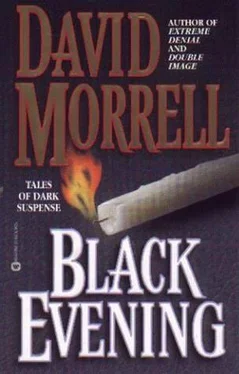David Morrell - Black Evening
Здесь есть возможность читать онлайн «David Morrell - Black Evening» весь текст электронной книги совершенно бесплатно (целиком полную версию без сокращений). В некоторых случаях можно слушать аудио, скачать через торрент в формате fb2 и присутствует краткое содержание. Жанр: Ужасы и Мистика, на английском языке. Описание произведения, (предисловие) а так же отзывы посетителей доступны на портале библиотеки ЛибКат.
- Название:Black Evening
- Автор:
- Жанр:
- Год:неизвестен
- ISBN:нет данных
- Рейтинг книги:4 / 5. Голосов: 1
-
Избранное:Добавить в избранное
- Отзывы:
-
Ваша оценка:
- 80
- 1
- 2
- 3
- 4
- 5
Black Evening: краткое содержание, описание и аннотация
Предлагаем к чтению аннотацию, описание, краткое содержание или предисловие (зависит от того, что написал сам автор книги «Black Evening»). Если вы не нашли необходимую информацию о книге — напишите в комментариях, мы постараемся отыскать её.
Black Evening — читать онлайн бесплатно полную книгу (весь текст) целиком
Ниже представлен текст книги, разбитый по страницам. Система сохранения места последней прочитанной страницы, позволяет с удобством читать онлайн бесплатно книгу «Black Evening», без необходимости каждый раз заново искать на чём Вы остановились. Поставьте закладку, и сможете в любой момент перейти на страницу, на которой закончили чтение.
Интервал:
Закладка:
No light came on. No weak footsteps shuffled near to let us in. I twisted at the bell again. We waited.
"Now what?" The deputy looked nervous.
"Give them time. They're old," I answered. "Or maybe they're not at home."
"Just one," the doctor told me.
"What?"
"There's only one. Her name is Agnes. She's eighty at least."
"Maybe she's sleeping."
"You don't think so. Otherwise we wouldn't be here."
I twisted the bell again. I hadn't lived in town for long. After too many years in the city, I'd brought my family to what I'd hoped was a better place, and as the new police chief, I was hardly eager to antagonize the townsfolk by disturbing an old woman.
All the same, the stench was horrible. It made my stomach rise, my nostrils widen with disgust. The neighbors' phone calls had been so persistent that I couldn't ignore them.
"All right, let's go in."
I tried the knob. The door was locked. I pushed, and the door came open with a sound as if the jamb had been cardboard. No sharp crack, instead a rip, a tear, so soft, so effortless. The wood was rotten at my feet.
"Is anybody here?" I called.
No answer.
So we looked at one another, and we stepped inside. The hall was dusty, the odor more intense.
We flashed our lights. The living room, or what I guess had once been called the parlor, was beyond an oval entrance to our right. The room was filled with stacks of newspapers, from the floor to above my head. There was a makeshift corridor that we could walk through, but the newspapers towered on each side.
"This could be it," I told the doctor. "Papers, wet and musty. If they moulded…"
"You don't think so."
We went through another oval doorway.
"Anybody home?"
I saw the grand piano, cobwebs glistening in my flashlight's glare. More newspapers towered around it.
"Hoarding. Some old folks…" The deputy's voice quavered. Abruptly he coughed, gagging from the stench.
"I guess we do it room by room," I told them.
So we went up to the attic, starting downward, trying for some order, some sane balance. Newspapers, 1929 and 1936, each room devoted to a decade, 1942 and 1958. We found a bedroom on the second floor, and it at least was normal, if by that is meant no clutter and no useless objects. But the bedroom was from the twenties, or so I guessed. I have no eye for furniture. The canopy above the bed, the stained glass fixtures, and the heavy hopsack covers on the chairs, these clearly were from another time.
The bed had not been slept in. We had tried the lights. They didn't work.
"She didn't pay her bill, I guess." The deputy coughed again.
The dust, the cobwebs, that pervasive cloying stench. We went with flashlights to the first floor, and the cellar is the place that you suspect you ought to check first but you always wait until last.
We stood inside the pantry on the first floor in the back, the stench even worse there. I strained to muster control as I pulled the door. The smell was like a veil that struck us, wafting up. We went down slowly, board by creaking board.
You know I'm a trained observer. I've been taught to stop emotion, just to take in what I see. But that's difficult, especially when you're staring by the aid of flashlights, and you see only one object at a time, the horror mounting until you don't think you can bear it.
First, the woman's headless body on the floor, the stench like old potatoes that have turned to liquid in their jackets. Something has seeped from her. The urge to vomit is uncontrollable.
Then, for no reason you can understand, you scan up with your flashlight, and you see her head jammed in the noose, the white hair dangling, flesh now viscous on her cheeks, her open eyes dissolving toward you.
But that isn't it yet, not the final detail, for once more without a reason you can understand, as if you know that it will be there, you aim your flashlight toward a corner, toward a tiny table meant for dolls and set for tea, where tied to a toy chair, slumped, is another body, small and lonely, a young girl. You know this from the long hair and the bow and dress; you wouldn't know it from the face which has been food for insects. And that isn't it yet, not the final detail, for the clothes she wears are not from our time, but rather from the old days, straw hat, button shoes and yellowed crinoline, a moth-eaten satin party dress, as if she wore a costume or had been compelled to act a part she didn't like, the bow around her neck so tight her blackened tongue is bulging out.
"My Christ," the deputy moans behind me, and the bile that spews up in my mouth is bitter, scalding.
"All right, help me understand this."
We are in my office downtown, its lights glaring painfully. Although the night outside is cold, filled with sudden autumn gusts, I have opened all the windows, turned the fan on, anything to clear the stench.
"She killed the child, then hanged herself, that much is obvious," I say. "But why? I'm new here. I don't understand this. What would make her do it?"
I hear the rattle of the fan.
The doctor clears his throat. "Agnes lived there since the house was new. She and her husband built it."
"But I thought that…"
"They had money then," the doctor goes on without pause. His voice is weak. "He was a banker. They were prosperous."
"The husband?"
"Andrew was his name. In 1928. The world was theirs. They had a child, a daughter who was three. She died that fall. Diphtheria. I know this from my father who was the doctor in charge of the case. He couldn't save the daughter, and he watched the parents ruined by their loss. The husband left one day. The wife became a recluse. It's so easy now in retrospect to understand. You see, from time to time there have been children missing, usually in autumn, just as now. That girl we found, for instance. All the people who've been looking for her. You'll soon have to notify her parents. I don't envy you. My guess is that as Agnes aged, as she became more lonely and reclusive, she went crazy. She tried to find a substitute for what she'd lost. She kidnapped children, but of course she couldn't let them live to tell what she'd done. She killed them but believed that they were still alive, her own child."
"The way children play make believe with dolls?" I ask.
"If that analogy helps you. This is sickness so bizarre it threatens sanity to think about it. Where did she put the corpses of those other children? Maybe when they started rotting, she couldn't sustain her make-believe. Maybe this final time she understood what she'd become and hanged herself."
"It works," the deputy says, nauseated, his face still ashen. "It makes sense."
"That's the trouble," the doctor says. "A lunatic's always logical, but the logic's horribly twisted."
There were many things to do. I'd put off phoning for an ambulance. I'd wanted to understand before the scene became disturbed, a clue destroyed, but I knew I had to act now, make those calls, tell the parents. I reached for the phone, but it rang in anticipation.
"Yes?" I asked, and then I listened, and I realized how wrong we'd been.
I set down the phone and peered at them.
"It wasn't her. It wasn't Agnes."
"What?" The doctor and the deputy stared.
"It was Andrew," I told them as I rushed toward the door.
"He left in 1928," the doctor repeated.
"No, he never left."
They ran out with me toward the cruiser.
"He's still in there."
"But we searched the place," the deputy insisted.
"He was in there. We were just too dumb to see him."
We scrambled into the cruiser. I sped from the station's lot.
"But I don't understand," the doctor said.
I didn't have the will or time to argue. I skidded around corners, raced up side streets. At that once great, now dilapidated section of the town, I ran out, hurrying past the ruined gate, up the weed-choked sidewalk, past the porch holes, through the stained glass door.
Читать дальшеИнтервал:
Закладка:
Похожие книги на «Black Evening»
Представляем Вашему вниманию похожие книги на «Black Evening» списком для выбора. Мы отобрали схожую по названию и смыслу литературу в надежде предоставить читателям больше вариантов отыскать новые, интересные, ещё непрочитанные произведения.
Обсуждение, отзывы о книге «Black Evening» и просто собственные мнения читателей. Оставьте ваши комментарии, напишите, что Вы думаете о произведении, его смысле или главных героях. Укажите что конкретно понравилось, а что нет, и почему Вы так считаете.












